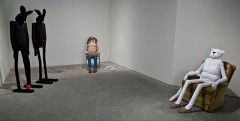Music Kristen Gill — August 4, 2013 12:36 — 0 Comments
Oliver Mtukudzi in Seattle – Kristen Gill
Sometimes you come across a musician that changes your perspective on life. Oliver Mtukudzi is one of those performers for me. Simply known as “Tuku†to his fans, he created what is known as “Tuku musicâ€, a blend of Southern African traditions, including mbira, mbaqanga, jit, and the traditional drumming styles of the Korekore. Mtukudzi turns 61 this year, and he was in concert at Dimitrious’ Jazz Alley supporting his 61st album.
In the opening of the night’s show in Seattle he sings, “Do you have to die to be a hero?†The question lingered in the air like a held note.
According to Mtukudzi, MUSIC is our food. We use music when we are lonely. We use music when we are waking. In Zimbabwe, you don’t get to sing a song when you have nothing to say. (Word up, Miley Cyrus!) He says that in the music the Zimbabweans talk about their pain and their joys. They’ll sing all day at a funeral. They’ll sing all day at a wedding. “We beautify the truth to diffuse the tension.†Isn’t that the truth?
Mtukudzi sings songs about the AIDS virus as well as political turmoil. One of his lyrics goes, “Help me Lord, I’m feeling low.†Even the dancers’ moves suggest the taking of one careful step after another, moving in the cyclical rhythm of life, back and forth, back and forth.
His song “Neria†is about the strength of women and how they should take a stand, claim their place, and not feel inferior to men. The tears started coming as soon as I heard the first few notes. Mtukudzi creates such beautiful music out of the destruction. He says, “That last song was for Neria. This next song is for you.†He might as well have been speaking to me personally – that’s how it felt. “There is no culture inferior to another. We are all unique,†he sang.
What I really liked was how Mtukudzi and his band, the Black Spirits, played together in with such synergy.  When one of them solos, the rest gather around, enjoying that person’s talent. Watching this appreciative circle form around the bandmates defined the feeling of “love†or “home†better than anything I’ve seen at a show lately. Let everybody feel their own beauty.
Mtukudzi’s new album, “Sarawogaâ€, means “Left Aloneâ€. He recorded it after the death of his son, who was 22 when he died in 2010. He and his son were supposed to work on this album together. In the liner notes, Mtukudzi writes,
“I look on my left, I see no one, but the void I have to learn to live with. Maybe the void was meant to be. After the pride of performing with my son in a story, a story to bring father and their sons close, I am left alone, ‘Sarawoga’. With no proof to show how a father and son can be. I do understand at some point I will join the journey, but it seems unfair to be awarded a void you can’t fill.â€
I don’t think there is anything worse than the death of one’s child. And yet, this musician has learned to carry on like he always will, like the way he taught his people to, like he inspires us to, like one has to. He says, “We will dance and sing now. There is no easy life. Life is what we make it,†explains Mtukudzi, seemingly answering his own question: Yes, you can be living and be a hero.
Of course, to end the show, Mtukudzi took the opportunity to share how grateful he was to be invited to Seattle, credited the sound guys, and thanked all the audience for coming. He then led the last song, jumped into the audience who were on their feet dancing at this point, and left via the back entrance, as though he wanted to keep the party going on without him. Which is what he has had to learn to do. And for those of us who are left behind, we have to learn to cherish the memory and keep on going, too.
The answer isn't poetry, but rather language
- Richard Kenney



